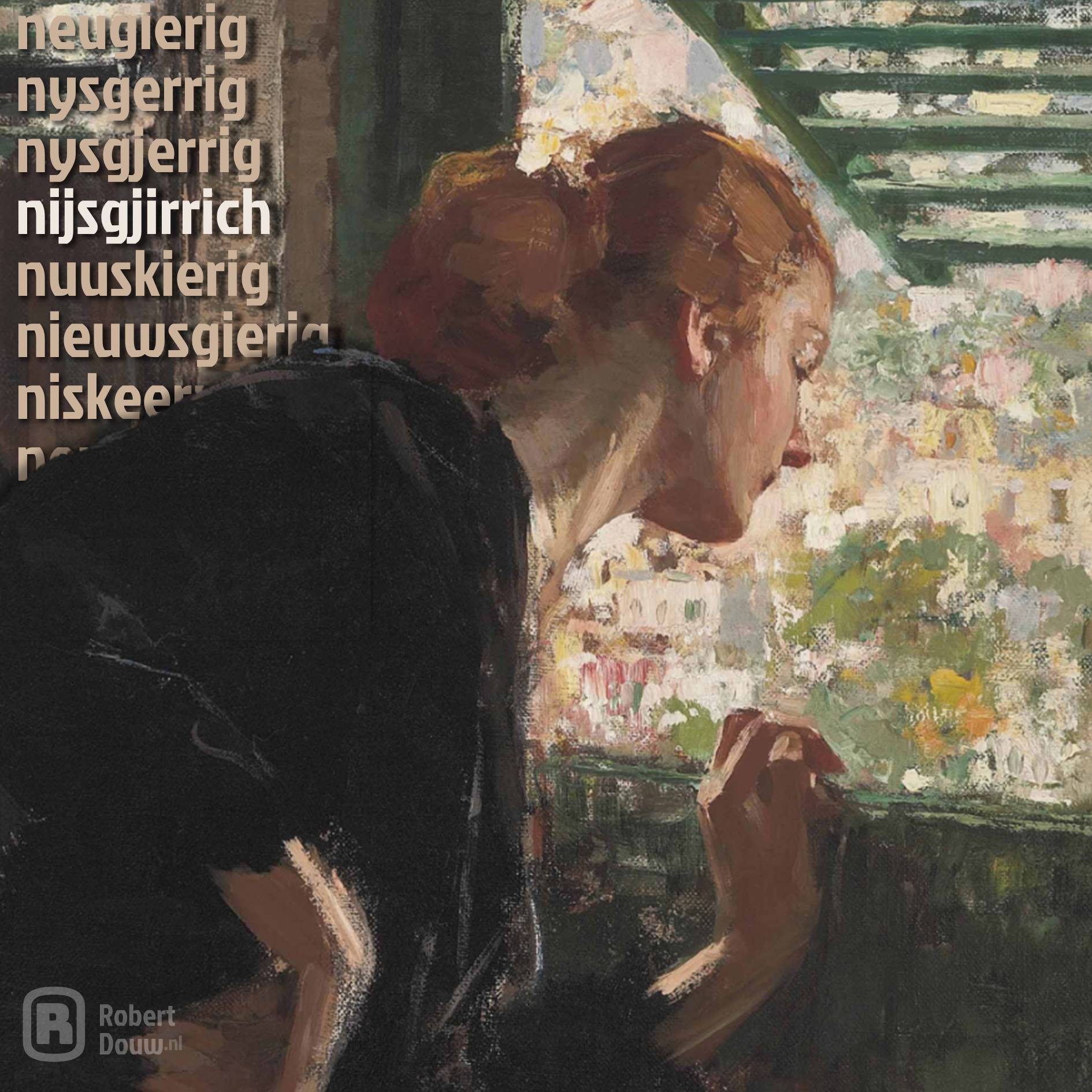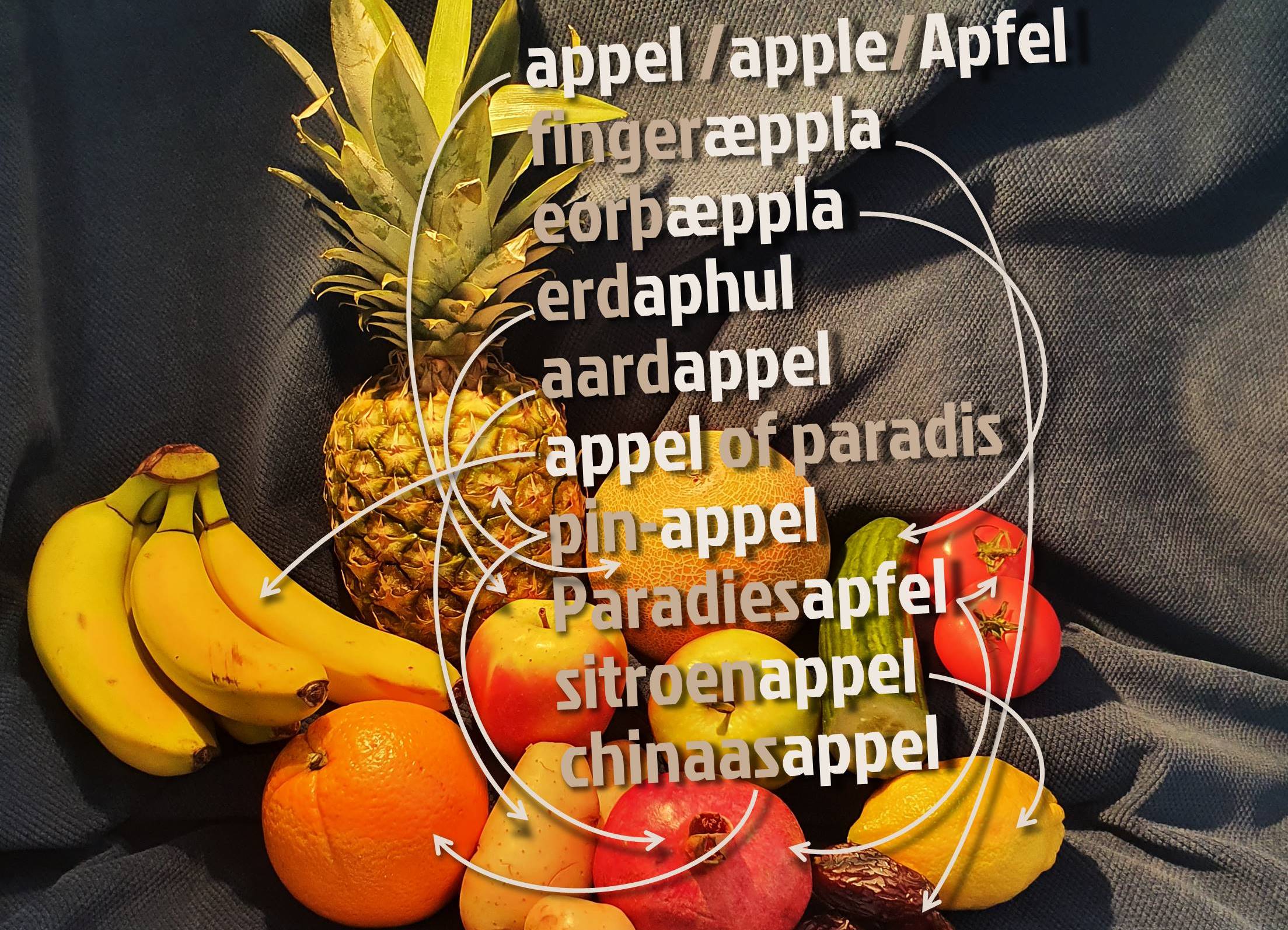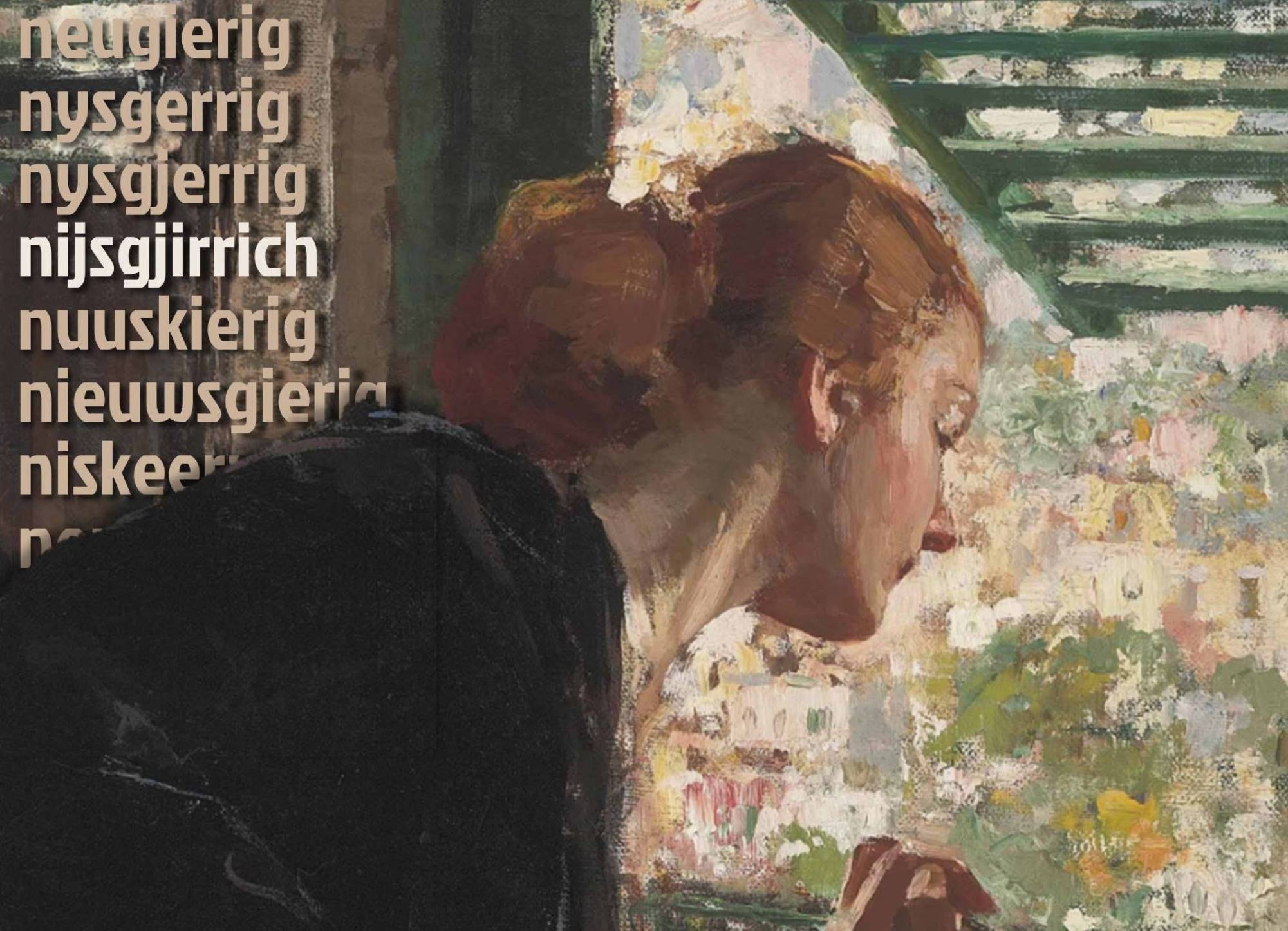WEST GERMANIC
Nijsgjirrich
Linguistics
| 15-08-2021
What makes a word truly Dutch, thoroughly German or typically Frisian? Is it the origin of the word? Or is it how the word is used? I wondered about that when I delved into the word nieuwsgierig ("curious" or "inquisitive") for this piece, because that word in Frisian – nijsgjirrich – has more meanings than in all other languages.
Nieuws-gierig
Looking at the word nieuwsgierig, one thing is immediately clear: it is a combination of the words nieuws (news) and gierig (litterally "stingy", but in the compound nieuwsgierig it has the older meaning "desirous of" or "eager for"). But then again... when the Dutch pronounce the word, it often sounds more like "nieuw-sgierig". That's easier to pronounce. Moreover, there is of course a common sound combination 'sch' in Dutch – in words such as handschoen (glove), sneeuwschuiver (snow shovel), schoonschrijven (calligraphy), opschieten (to hurry up) and inschatten (assess) – which I think also influences the pronunciation of nieuwsgierig. This suspicion is fed by the fact that I regularly see students writing "nieuwschierig".
If you take the trouble of looking analytically at the word nieuwsgierig, it is quite easy to recognize from which parts the word is composed. However, with that we still don't know anything about the origin of the word. As always, I start my search for the origin of a word at etymologiebank.nl, but in the case of the word nieuwsgierig, it doesn't contain the information I expected to find. And so I have to keep looking. After looking up the word "nieuwsgierig" and parts of that word in different languages and different spellings in a variety of websites and books, and sorting it out as best I could, I come to the following.
[Text continues below the image]

Germanic, but not Germanic
Nieuwsgierig occurs in almost all Germanic languages, but you can't really call it a Germanic word. It seems that it only came into existence well after Germanic had split up into all kinds of variants that we see as separate languages. German neugierig (without possessive-s, although one of my sources indicates it was originally neusgierig, in line with the other languages) is known to have occurred in the mid-16th century. The oldest site of the Dutch nieuwsgierig is 1625. The Frisian nijsgjirrich seems to be a literal translation of the Dutch word, found from 1819. In the same way, Afrikaans got the word nuuskierig.
Norwegian and Danish have nysgjerrig and nysgerrig, both derived from German neugierig. The fact that those two languages also have a possessive-s makes it more likely that German also had one. What also strikes me, is that the Norwegian word at the beginning of gjerrig has the gj- which you also see in the Frisian gjirrich. Unfortunately I don't speak Norwegian and I don't really know much about the language, so I can't tell you whether there is a link with Frisian. What I do know, is that in Frisian there is something called "vowel breaking" (or "brekking" in Frisian). This phenomenon originated around 1700 and means that diphthongs (such as the 'ie' in gier) often change in plurals, diminutives and compounds, making it not gierich, but gjirrich.
News-yearning
That neugierig was only composed of neu and gierig in Early New High German, and that nieuwsgierig was only taken from German or composed of nieuw(s) and gierig in Early New Dutch can also explain why there is no similar word in English. And as far as I've been able to find, there never has been. It seems that American English has known niskeery for a while, a derivative of the Dutch word, but I haven't been able to google up any recent use of that word. The Scottish National Dictionary mentions under 'news' the word news-gizzened, which is reminiscent of nieuwsgierig, but I haven't been able to find whether gizzened is related to gierig or whether the Scots still use the word, but 'computer says no'.
The Digitales Wörterbuch der deutschen Sprache mentions in the etymology of neugierig that the piece -gierig is related in descent to gern, in Dutch gaarne. Etymologiebank.nl does have an explanation of the latter, and one of the words in that explanation is the Old Frisian form jerne, which reminded me of English yearning. That word indeed appears to come from the same Indo-European root *g̑her- as gierig in neugierig. Would English perhaps have known the word news-yearning, or something like neowe-gierning in Old English? Unfortunately, whatever variant I try, Google doesn't think so.
Dat fyn ik nijsgjirrich
So much for the word's origin, it's time to look at its usage. In Dutch there is one clear (main) meaning: someone who is nieuwsgierig, desires to know or perceive something. You can differ in the exact meaning of the word, for example whether what you want to know is actually intended for you or not, but it all comes down to the same thing. In older Dutch, nieuwsgierig was also used as an adverb meaning “With care, so that one pays very close attention; fr. Curieusement” and “In a way that shows the desire to know or see something.” As far as I have been able to find, nuuskierig, neugierig, nysgjerrig and nysgerrig are also all adjectives with one or two meanings. That's very different with the Frisian nijsgjirrich.
The Wurdboek fan de Fryske Taal (WFT) mentions eight different meanings for nijsgjirrich, the Frysk Hânwurdboek even comes to ten: 'graach wat witte of hearre wollend, benijd wêzend nei, in min sin hawwend (as eigenskip of op in beskaat stuit), samar rekke, út jins gewoane dwaan en dat noartsk uterjend, niget oproppend, oars as men wend is, net faak foarkommend (en dêrtroch opfallend), naustekkend, net gau tefreden wêzend' (wanting to know or hear something, being curious about, being grumpy (as a characteristic or at a certain moment), easily offended, disgruntled and expressing it surly, calling up interest, different from one's accustomed, infrequent (and therefore conspicuous), "mattering much", not being easily satisfied).
Some of those meanings may overlap somewhat, and some of those meanings are more common in everyday language than others, but still, there is a clear difference with the other languages. I think the most striking and most beautiful difference is that in Frisian you can not only be nijsgjirrich, but that you can also find something nijsgjirrich, as you would find it interesting in English. I have not been able to find that meaning in the other languages and it therefore seems to have originated in Frisian, in the relatively short time since Frisian took over the word from Dutch. In fact, according to the WFT, the use in the sense of 'interesting, arousing interest' is 'greatly emerging in the 20th century' and is therefore a very recent extension of the Frisian vocabulary. Whether nieuwsgierig is originally a German or Dutch word, or both, may not be entirely clear, but it is certain that nijsgjirrich has become Frisian through and through in certain meanings. And that's something I find very nijsgjirrich.
Nieuws-gierig
Looking at the word nieuwsgierig, one thing is immediately clear: it is a combination of the words nieuws (news) and gierig (litterally "stingy", but in the compound nieuwsgierig it has the older meaning "desirous of" or "eager for"). But then again... when the Dutch pronounce the word, it often sounds more like "nieuw-sgierig". That's easier to pronounce. Moreover, there is of course a common sound combination 'sch' in Dutch – in words such as handschoen (glove), sneeuwschuiver (snow shovel), schoonschrijven (calligraphy), opschieten (to hurry up) and inschatten (assess) – which I think also influences the pronunciation of nieuwsgierig. This suspicion is fed by the fact that I regularly see students writing "nieuwschierig".
If you take the trouble of looking analytically at the word nieuwsgierig, it is quite easy to recognize from which parts the word is composed. However, with that we still don't know anything about the origin of the word. As always, I start my search for the origin of a word at etymologiebank.nl, but in the case of the word nieuwsgierig, it doesn't contain the information I expected to find. And so I have to keep looking. After looking up the word "nieuwsgierig" and parts of that word in different languages and different spellings in a variety of websites and books, and sorting it out as best I could, I come to the following.
[Text continues below the image]

Germanic, but not Germanic
Nieuwsgierig occurs in almost all Germanic languages, but you can't really call it a Germanic word. It seems that it only came into existence well after Germanic had split up into all kinds of variants that we see as separate languages. German neugierig (without possessive-s, although one of my sources indicates it was originally neusgierig, in line with the other languages) is known to have occurred in the mid-16th century. The oldest site of the Dutch nieuwsgierig is 1625. The Frisian nijsgjirrich seems to be a literal translation of the Dutch word, found from 1819. In the same way, Afrikaans got the word nuuskierig.
Norwegian and Danish have nysgjerrig and nysgerrig, both derived from German neugierig. The fact that those two languages also have a possessive-s makes it more likely that German also had one. What also strikes me, is that the Norwegian word at the beginning of gjerrig has the gj- which you also see in the Frisian gjirrich. Unfortunately I don't speak Norwegian and I don't really know much about the language, so I can't tell you whether there is a link with Frisian. What I do know, is that in Frisian there is something called "vowel breaking" (or "brekking" in Frisian). This phenomenon originated around 1700 and means that diphthongs (such as the 'ie' in gier) often change in plurals, diminutives and compounds, making it not gierich, but gjirrich.
News-yearning
That neugierig was only composed of neu and gierig in Early New High German, and that nieuwsgierig was only taken from German or composed of nieuw(s) and gierig in Early New Dutch can also explain why there is no similar word in English. And as far as I've been able to find, there never has been. It seems that American English has known niskeery for a while, a derivative of the Dutch word, but I haven't been able to google up any recent use of that word. The Scottish National Dictionary mentions under 'news' the word news-gizzened, which is reminiscent of nieuwsgierig, but I haven't been able to find whether gizzened is related to gierig or whether the Scots still use the word, but 'computer says no'.
The Digitales Wörterbuch der deutschen Sprache mentions in the etymology of neugierig that the piece -gierig is related in descent to gern, in Dutch gaarne. Etymologiebank.nl does have an explanation of the latter, and one of the words in that explanation is the Old Frisian form jerne, which reminded me of English yearning. That word indeed appears to come from the same Indo-European root *g̑her- as gierig in neugierig. Would English perhaps have known the word news-yearning, or something like neowe-gierning in Old English? Unfortunately, whatever variant I try, Google doesn't think so.
Dat fyn ik nijsgjirrich
So much for the word's origin, it's time to look at its usage. In Dutch there is one clear (main) meaning: someone who is nieuwsgierig, desires to know or perceive something. You can differ in the exact meaning of the word, for example whether what you want to know is actually intended for you or not, but it all comes down to the same thing. In older Dutch, nieuwsgierig was also used as an adverb meaning “With care, so that one pays very close attention; fr. Curieusement” and “In a way that shows the desire to know or see something.” As far as I have been able to find, nuuskierig, neugierig, nysgjerrig and nysgerrig are also all adjectives with one or two meanings. That's very different with the Frisian nijsgjirrich.
The Wurdboek fan de Fryske Taal (WFT) mentions eight different meanings for nijsgjirrich, the Frysk Hânwurdboek even comes to ten: 'graach wat witte of hearre wollend, benijd wêzend nei, in min sin hawwend (as eigenskip of op in beskaat stuit), samar rekke, út jins gewoane dwaan en dat noartsk uterjend, niget oproppend, oars as men wend is, net faak foarkommend (en dêrtroch opfallend), naustekkend, net gau tefreden wêzend' (wanting to know or hear something, being curious about, being grumpy (as a characteristic or at a certain moment), easily offended, disgruntled and expressing it surly, calling up interest, different from one's accustomed, infrequent (and therefore conspicuous), "mattering much", not being easily satisfied).
Some of those meanings may overlap somewhat, and some of those meanings are more common in everyday language than others, but still, there is a clear difference with the other languages. I think the most striking and most beautiful difference is that in Frisian you can not only be nijsgjirrich, but that you can also find something nijsgjirrich, as you would find it interesting in English. I have not been able to find that meaning in the other languages and it therefore seems to have originated in Frisian, in the relatively short time since Frisian took over the word from Dutch. In fact, according to the WFT, the use in the sense of 'interesting, arousing interest' is 'greatly emerging in the 20th century' and is therefore a very recent extension of the Frisian vocabulary. Whether nieuwsgierig is originally a German or Dutch word, or both, may not be entirely clear, but it is certain that nijsgjirrich has become Frisian through and through in certain meanings. And that's something I find very nijsgjirrich.

WEST GERMANIC
Heit

WEST GERMANIC
All apples
LINGUISTICS
Click here for an overview of everything in the Linguistics section.
